_We may earn revenue from the products available on this page and participate in affiliate programs. Learn more ›
_
Best Overall
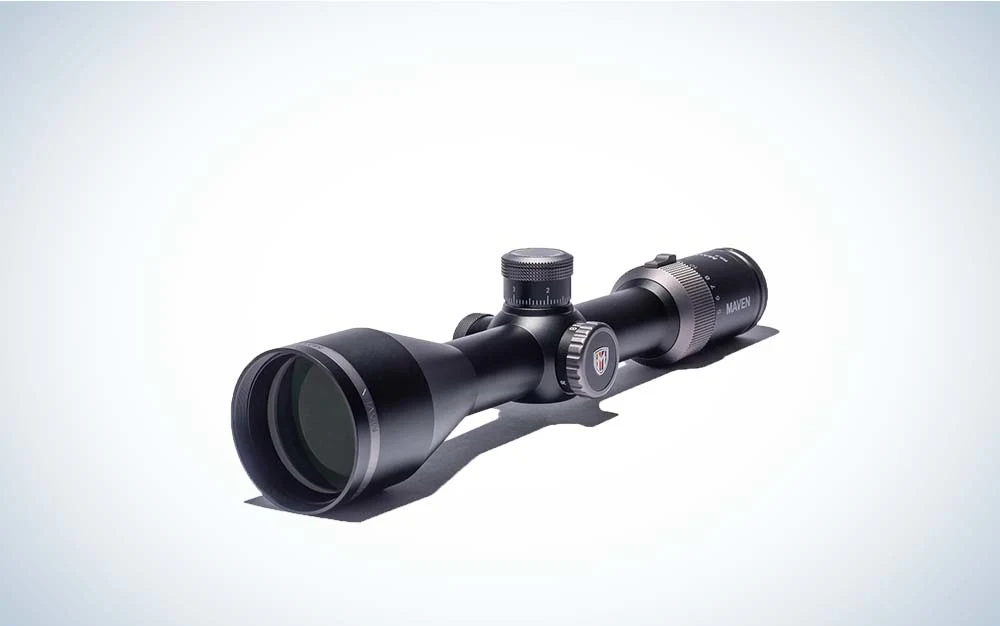
Maven RS 3.2 – 5-30×50
LEARN MORE
Summary
The Maven’s clarity and long-range capabilities are great on their own, but it’s the excellent turrets and ease of adjustments that make it worth the price point.
Best Long Range
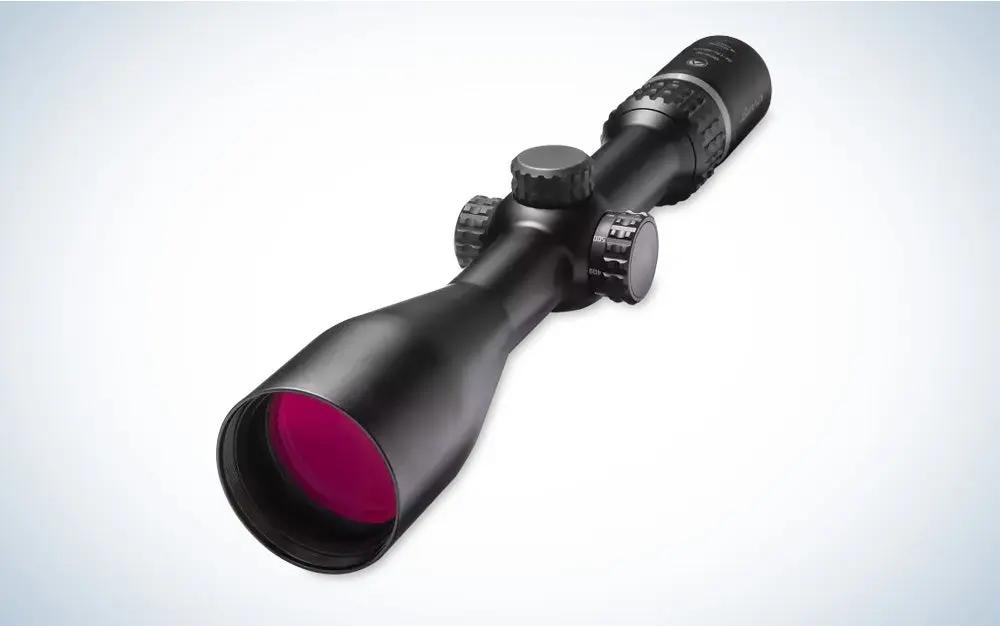
Burris Veracity FFP
LEARN MORE
Summary
The Veracity’s versatility is matched only by its price point, which is ideal for a first focal plane optic meant for ranges to 500 yards and beyond.
Best Under $300
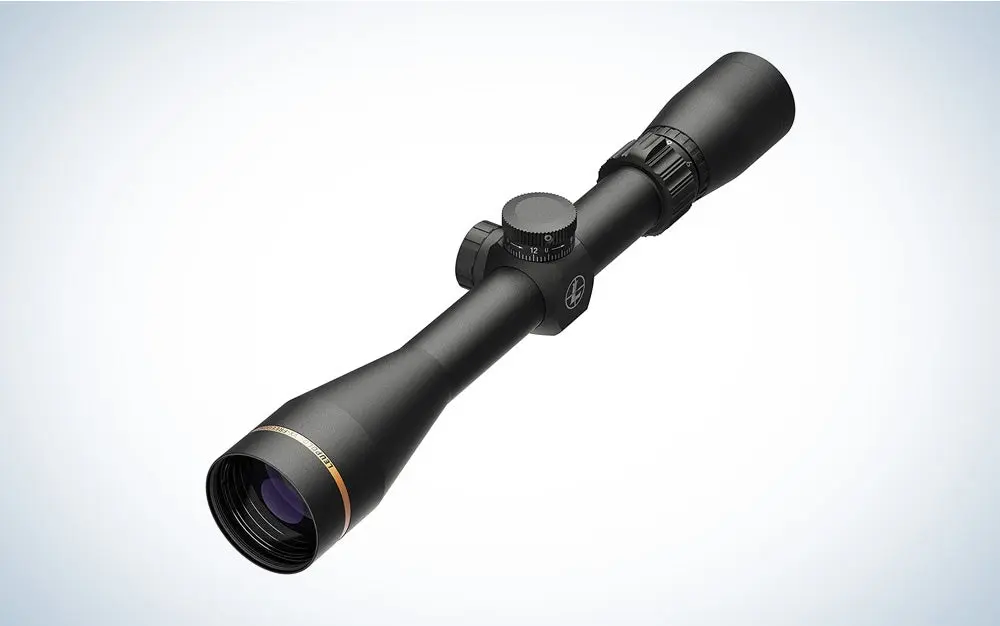
Leupold VX-Freedom 3-9x40mm
LEARN MORE
Summary
The VX-Freedom offers the clarity and scope quality hunters have come to expect from the Leupold name with an extremely affordable price tag.
While there are not really any caliber-specific 308 scopes, the right optic makes all the difference with this popular cartridge. The round may have begun its life in the military, but arguably landed its lasting impact in the hands of countless hunters who have used it to fill the freezer season after season. And why not? The 308 Winchester is a very capable hunting round perfect for taking down deer, elk, and other big game with ease. At the same time, it has a much more pleasant recoil than the 30/06.
The 308 is also a highly accurate round, but shooters can still put themselves at a disadvantage with a poor scope choice, which is why picking the best rifle scope
is so important. Because the 308 is versatile for so many scenarios, there is no one perfect one-size-fits-all pick. As such, we’re recommending the best 308 scopes that fit a variety of ranges, budgets, and case uses.
Best Overall: Maven RS 3.2 – 5-30×50
Best Under $300: Leupold VX-Freedom 3-9x40mm
Best Value: Sig Sauer Buckmasters Combo
Best Long Range: Burris Veracity FFP
Best Mid-Range: Meopta Optika 5 2-10×42
Best Short-Range: Eotech Vudu 1-10×28 FFP
Best for Brush Guns: Vortex Crossfire II
Best Glass Clarity: Leupold VX-3HD 4.5-14×40
How We Picked the Best 308 Scopes
As we already mentioned, there are not really any 308-specific scopes. Manufacturers today seem to only make a limited number of caliber-specific scopes. And those options have been mostly limited to select rounds like the niche 350 Legend or the somewhat controversial 6.5 Creedmoor
. Nikon made a 308-specific scope for a while, but they have since discontinued the manufacturing of firearms scopes, so it’s no longer an option. Thus, we had to go with standard rifle scopes that aren’t really specifically tailored to any caliber. That’s not a bad thing. Because 308 is such a versatile round, it opened a bevy of possibilities for us to choose from in the current scope market.
We considered many factors when choosing the best options for this caliber. Our own experiences with the different brands weighed heavily here. But we went deeper in the weeds than that. The 308’s versatility forced us to think about the best case use of each scope. Some hunters like the 308 for the vast plains of the American west. Others use it as their brush gun caliber of choice in swamps and dense forests. And of course, different case uses have different requirements in terms of magnification, reticles, etc. For the purposes of the 308, we considered some of the following factors more heavily.
Case Use: Is this a long range scope meant for the open west? Or is it a short-range brush scope better suited for the Eastern U.S.? Or does it have some entirely different best case use?
Magnification: What type of magnification does this scope have? What ranges does it make sense for?
Reticle: What type of design is the reticle? Does it feature multiple aim points for distance and wind holds? Is it first or second focal plane? And is it illuminated for low light?
Weight: Is this scope light enough that it won’t make lighter hunting rifles more unwieldy?
Eye Relief: How much does the scope have? Is it comfortable to operate with both eyes open?
Budget and Value: How does the scope’s quality compare to the construction? Does the scope offer additional features that increase the value?
Best 308 Scopes: Reviews and Recommendations
Best Overall: Maven RS 3.2 5-30×50
Best Overall

Specs
Weight: 27.8 oz
Magnification Range: 5-30
Objective Diameter: 50mm
Reticles: Front focal plane MOA-2/SHR-W, SHR-MIL
Pros
Lifetime warranty
Excellent clarity
Custom turrets can be added
Cons
Weight
Maven’s latest upgrade to their popular RS line is a great all-around scope for hunting. The glass offers excellent clarity, and the front focal plane is ideal for the 308’s long-range capabilities. There is also a good amount of eye relief. But where this scope shines the most is the adjustability. The turrets are large and easy to manipulate, and there is a zero stop. The scope also offers a capped windage turret. For shooters who want even more precision, this optic allows the addition of a custom turret.
It’s a little heavier than we’d like, but it really shines for hunting western states where shots can fall in the mid to longer ranges. It’s not cheap at $1,600, but it’s worth the cost in our book. The Maven is an investment, but we like it as a long-term one that will fill the freezer not just for one year, but for many seasons to come.
Best Under $300: Leupold VX-Freedom 3-9x40mm
Best Under $300

Specs
Weight: 12.2 oz
Magnification Range: 3-9
Objective Diameter: 40mm
Eye Relief: 4.2″ (low)
Reticles: Second Focal Plane Hunt-Plex, Duplex CDS
Pros
Great lens clarity
Affordable
Rugged construction
Cons
Not a long range scope
Why are lens covers not included?
At $295, this 308 hunting scope is a real bargain, and has that signature Leupold ruggedness that we’ve come to expect from the brand. I bought this scope last year, and it easily helped me fill the freezer come November. While there’s not a lot of fancy bells and whistles to this scope, it doesn’t really need them. And it has excellent clarity. I was also quite impressed with the low light capabilities considering the size of the objective lens. The most puzzling aspect of this scope for me was searching through the box and finding no scope covers. I’m not sure why Leupold doesn’t include them standard, but I can overlook that aspect considering the overall quality and price point of the build.
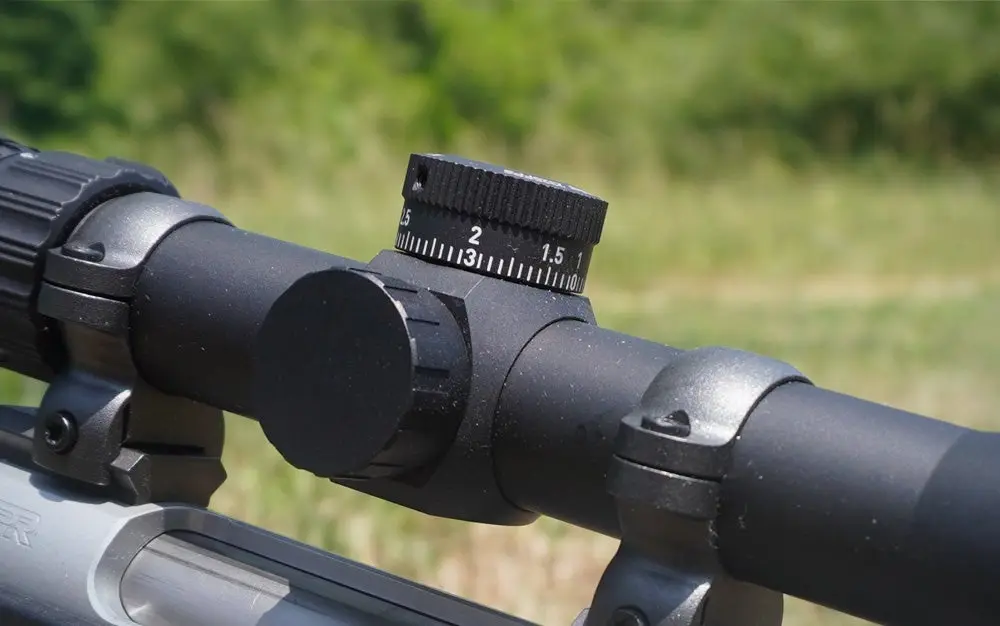
The Leupold’s turrets are extremely easy to adjust. Photo by Travis Smola
This scope is going to work best for scenarios where shots are going to be 300 yards and under. At 100 yards and under, it’s downright deadly. This optic is ideal for brush guns in eastern states where the terrain and tree cover limit shot opportunities. Leupold’s scopes are also made here in the U.S., which makes it a good option for those who want to buy American. Throw in Leupold’s lifetime guarantee, and this is a low risk, high reward option for any hunter on a budget.
Best Value: Sig Sauer Buckmasters Combo
Best Value
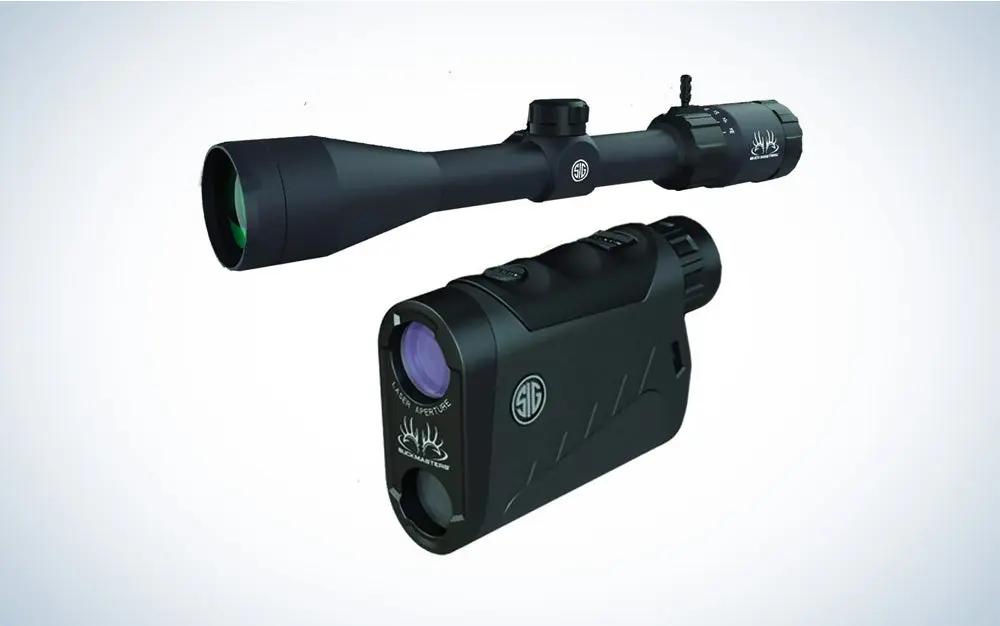
Specs
Weight: 14 to 19 oz
Magnification Ranges: 3-9, 3-12, or 4-16
Objective Diameter: 40, 44, or 50mm
Reticle: Second focal plane Buckmasters BDC
Pros
Extremely affordable
Good eye relief
Bonus rangefinder
Cons
Not great for long range
We know it seems like it’s hard to find any bargains anymore, but this scope is up there. This second focal plane scope is perfect for ranges under 200 yards. Although with a little fine tuning and practice, there’s no reason it can’t reach out to at least 500 either. Anything beyond that will probably be pushing it. This is more of a brush gun scope than anything. The scope offers more than 4 inches of eye relief, which makes it great for shooters who like to keep both eyes open.
This scope combo package will sometimes go on sale for under $200, which is a tremendous bargain for the budget-minded hunter. The big thing that adds to the value of this package is the inclusion of a laser rangefinder. It’s not the fanciest rangefinder on the market. But F&S Shooting Editor Richard Mann gave it a whirl during the annual F&S best rifle scopes
test. He found it to be effective out to 1,000 yards. The rangefinder also adds some functionality to the scope in the form of eight internal ballistic groups. Consequently, those groups will help you dial in the effectiveness of this scope for the ranges most often hunted. Take the rangefinder on the hunt with you, and you can make the shot with confidence knowing the exact distance is the same as practice.
Best Long Range: Burris Veracity FFP
Best Long Range

Specs
Weight: 25.1 oz
Magnification Ranges: 3-15, 4-20, or 5-25
Objective Diameter: 50mm
Reticles: First focal plane Ballistic Plex E1
Pros
Great magnification
Highly affordable FFP
Turrets can be swapped out for custom
Cons
Weight
No illumination
It’s easy to forget that the 308 has long range capabilities that are right up there with popular modern rounds like the 6.5 Creedmoor. Additionally, it’s hard to find a first focal plane scope for long range that also won’t burn an at least $1,000+ hole in your pocket in the process. However, Burris manages to keep the price tag around $800 for the Veracity. Although it has an FFP design, the reticle is never reduced so far as to make it difficult to see. Another nice feature of this scope is the addition of Burris’ Modular Adjustment Dial (M.A.D) system. This allows the user to swap out the turrets to their preferred style. Especially for those who might find the stock ones a little on the mushy side.
The main reticle here is a Ballistic Plex E1 with dots for wind drift compensation. Basically, it has trajectory compensation between 600 and 700 yards depending on the model. That range is probably a little excessive for most average hunters, but it’s nice to know the option’s there. This scope doesn’t have illumination, but the larger 50mm objective lens does a fine job of gathering light for most scenarios. Because the 308 starts to drop rather significantly around the 300-yard mark, the 3-15 magnification is solid for that distance. For shooters planning to push the round’s capabilities to 500+ yards or more, go with the 4-20 or 5-25. This is one of the best budget rifle scopes for mule deer and pronghorns in vast, open states where getting closer than 400 yards is difficult.
Best Mid Range: Meopta Optika 5 2-10×42
Best Mid Range
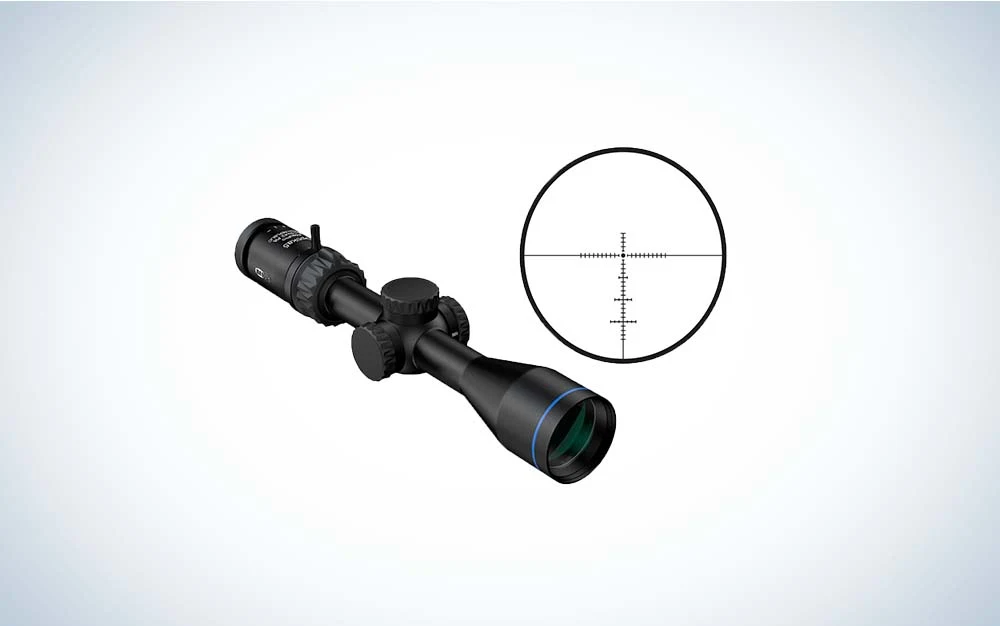
Specs
Weight: 21.5 oz
Magnification Range: 2-10
Objective Diameter: 42mm
Reticle: Second Focal Plane Z-Plus MOA
Pros
Good price point
Transferable lifetime warranty
Precise turret adjustments
Cons
Reticle isn’t great for low light
Everyone’s definition of mid-range will likely vary depending on the skills of the shooter. However, the Czech-made Meopta is a solid scope for ranges between 100 and 500 yards. It’s not a 1,000 yard scope
because of the second focal plane. However, the magnification setting is easy to see when you are still lined up behind the scope. The reticle can be hard to see in low light, but the operation of the scope is excellent.
This scope features excellent, precise adjustments to the turrets, which can be reset to zero rather easily. We like this scope for most North American deer hunting scenarios regardless of subspecies. Additionally, the scope comes at a rather affordable price point and a lifetime warranty that can be transferred. As if that wasn’t enough, there is also a removable throw lever, lens covers, and a cloth included. There’s a ton of value here for a mid-range scope.
Best Short Range: Eotech Vudu 1-10×24 FFP
Best Short Range
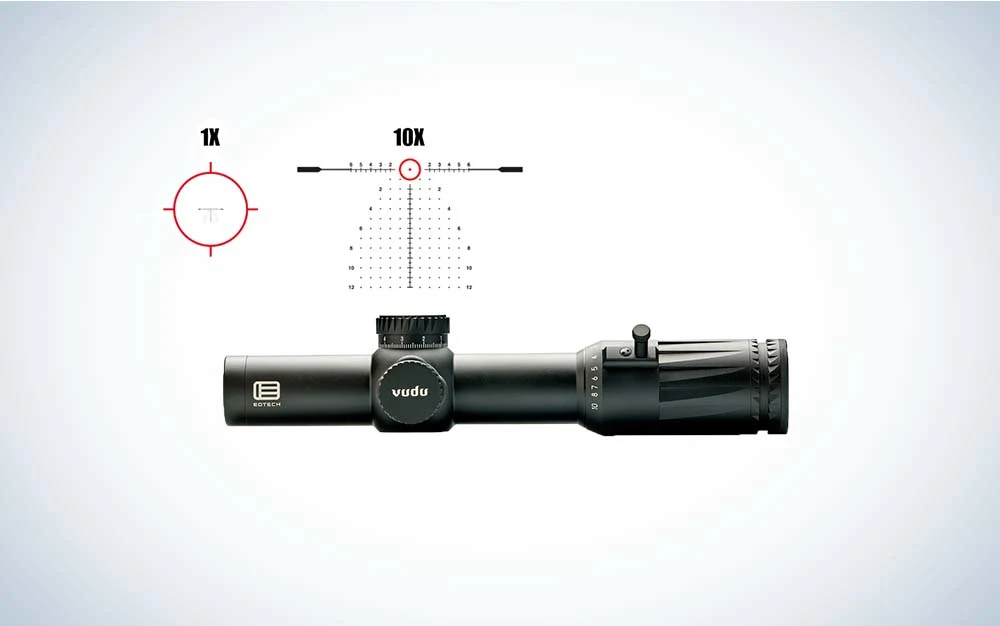
Specs
Weight: 20.10 oz
Magnification Range: 1-10
Objective Diameter: 24mm
Reticle: First Focal Plane MIL or MOA
Pros
Illuminated reticle
Excellent turrets
Great for fast shooting
Cons
Expensive
Surprisingly heavy
This LVPO scope was also tested by Mann, who found the illuminated FFP reticle is best suited for fast shooting at close range. This would likely a good choice for making multiple shots on fast-moving feral hogs through thick brush. It would also be a good choice for areas where your range will be limited under 100 yards. Considering the dimensions, the scope is a little heavy, but some of that is due to the battery that illuminates the reticle. The control for this reticle is extremely easy to use when you need it.
This scope also offers some good eye relief that makes it conducive for shooters who like to keep both eyes open. Especially while tracking a fast-moving animal moving through thick cover. It could be a solid option for anyone who likes to drive deer, but wants more range. Although we like this scope best for close range, it is also capable of reaching out on longer shots if needed.
Best for Brush Guns: Vortex Crossfire II
Best for Brush Guns
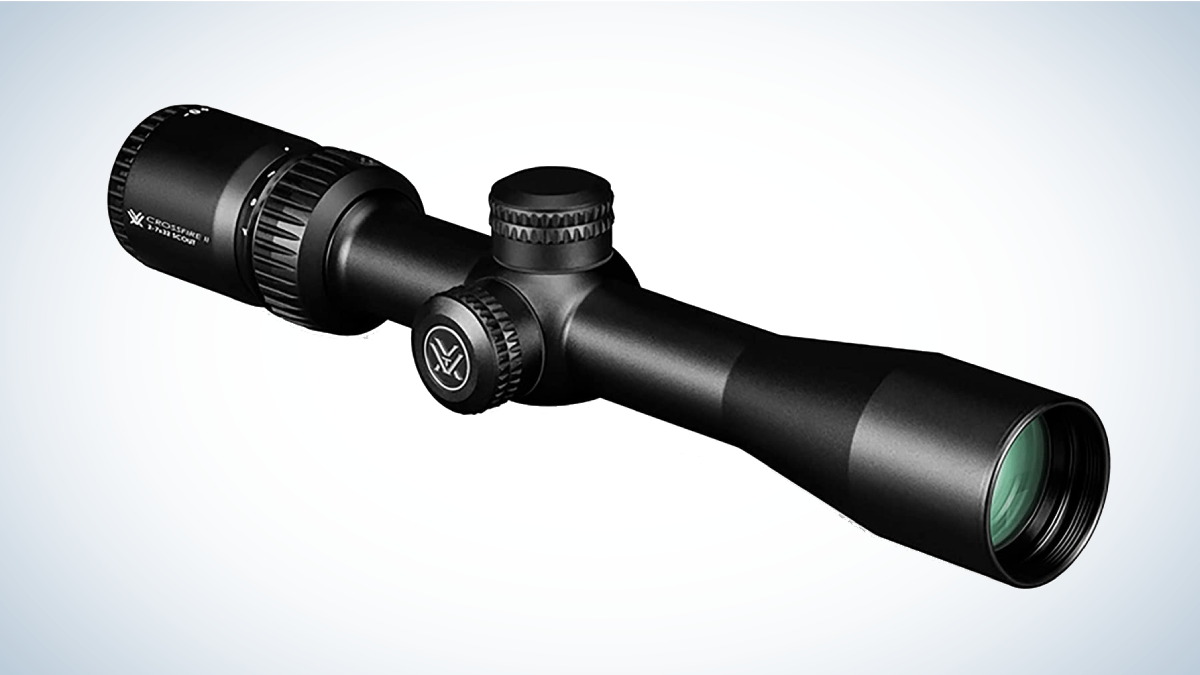
Specs
Weights: 14.8 to 23.6 oz
Magnification Ranges: 1-4, 3-12, 4-16, 4-12
Objective Diameter: 24, 40 and 50mm
Reticles: Second focal plane (Various depending on model)
Pros
Extremely affordable
Versatile number of options
Easy to adjust
Cons
Clarity isn’t the best
The Vortex Crossfire has become one of the most popular scopes. Rifle/scope combo packages are often offered with the Crossfire. This is another scope I’ve personally tested. Although I like the clarity of the Leupold mentioned earlier in this list a little better, the Vortex has a lot going for it. This is our pick for a rugged brush gun where range might be limited because there is such a range of magnifications offered. Use the 1-4×24 version for short bolt-action rifles where shots are under 200 yards. For long-range shots to 300 or more, go with 4-16×50 AO.
Even though this is a budget scope, the higher magnification version offers a dead-hold BDC reticle that lets the user dial in the distances. For hunters looking for something for low light scenarios, go with one of the Crossfires with a V-Brite MOA illuminated reticle. There is just about something for everyone with the Crossfire. Considering these scopes go for under $300 and as low as $200, there’s a lot to like about the line besides just the features.
Best Glass Clarity: Leupold VX-3HD 4.5-14×40
Best Glass Clarity

Specs
Weight: 13.3 oz
Magnification Range: 4.5-14
Objective Diameter: 40mm
Reticle: Second focal plane CDS-ZL reticle
Pros
Excellent clarity
Reticle offers multiple aiming points to 600 yards
Affordable price point
Cons
Requires a bit more tuning for long range
Leupold’s reputation for glass clarity is mostly unmatched in the industry. They have a ton of optics that are suitable for 308. However, we like the VX-3HD 4.5-14×40 specifically because it is a hunting-first scope designed in conjunction with Boone & Crockett Club. This scope is a second focal plane optic, but the CDS-ZL reticle has 10 mph wind holds and aim points that will help shooters take advantage of the 308’s 500-yard capabilities. It might take a little extra range time and ammo, but it’s very doable with this design. At $700, this is a solid scope for western long range hunting that won’t totally break the bank.
Additionally, we like the 13.3-ounce weight. It’s one of the lighter scopes on this list and will make your rifle easier to carry over tough terrain and long distances in the backcountry. It’s hard to go wrong with a Leupold for hunting, especially one like this that has been purpose-designed for putting meat in the freezer season after season.
What to Consider When Choosing a 308 Scope
Because there’s no one-size-fits all approach to 308, scope selection must be very specific for the scenario you plan to use it. It makes no sense to buy a super long range scope in a state where your longest shot is going to be 150 yards in a brushy swamp. Here are some of the more important things to consider when deciding on a scope.
Magnification
While the 308 is very capable at longer distances, the maximum magnification should probably be at least 10 for distances between 400 and 1,000 yards. Although more magnification isn’t always the best answer either. If most of your shots are under 200 yards, having a low end magnification that’s too high can make finding your target difficult. Mistakes like that can cost people deer. Subsequently, it’s best to stick with a low end magnification of three or four for shorter distances.
Most super long range scopes today have a 15, 20, or 25x magnification. There are scopes that go higher than that, but many experienced long range rooters rarely go beyond 20 magnification. This is because the higher the magnification is cranked, the smaller the field of view becomes. It’s all about finding balance and comfort with long range shooting. It’s also why proficient long range shooters spend so much time at the range because it takes time to build these skills.
Focal Plane
Focal planes matter most when considering the yardage you will be shooting. Neither of these planes is better than the other, but they do have best case use scenarios. Scopes with a front focal plane have the reticle positioned front of the scope closest to the eye. Secondary planes put the reticle in the one farthest from the eye. That’s not the only major difference though. With an FFP, the size of the reticle seemingly changes as you increase or decrease the magnification. The reticle will normally appear quite small on lower magnifications and increase from there. Conversely, a SFP features a fixed reticle that never changes with magnification adjustments.
Because the reticle can be quite small on lower magnifications, some shooters may have difficulty seeing it. People with vision problems should be aware of this before they purchase one of these scopes. The optic itself isn’t broken, this is simply how they operate.
Parallax
Parallax sounds confusing, but it simply refers to what happens when the target and reticle are focused at different distances. The shooter’s head position can cause tiny imperfections in alignment that affect accuracy. Hunters who are planning to keep their shots under 200 yards usually don’t need to worry about parallax adjustments. Most budget scopes like the Leupold VX-Freedom on this list have a fixed parallax-free distance.
However, once you start shooting at distances of 200, 300, 400 yards or more, parallax adjustments become very important. Parallax fixes the tiny imperfections that are present if the shooter’s head is not perfectly in alignment. There’s more to parallax we don’t have the time to cover here, but is in our hunter’s guide to scope parallax
. In short, just know that you don’t need to worry much about it if you are keeping your shots inside a 150-yard window.
FAQs
Q: How much will a 308 drop at 500 yards?
The 308 has good muzzle velocity and energy, but it does start to drop off rather quickly after 300 yards. Most factory ammo sees a drop of 40 to 50 inches at 500 yards. At 400 yards, it’s roughly half of that. Some handloads will shoot slightly flatter than this, but the large drop-off is common for most 308 rifles and scenarios.
Q: How far can a 308 shoot without dropping?
When it comes to bullet drop, most ammo manufacturers give their rounds a 200-yard zero. This varies depending on the bullet type and weight. The length of the test barrel also matters. But, 24” is usually the standard for manufacturer testing. However, that 200-yard zero estimate seems to be rather standard in the firearms industry as far as the 308 is concerned.
Q: What is the hunting range of 308?
While there are plenty of stories and videos of hunters taking elk and deer at extreme long ranges with the 308, the safe effective range is much shorter when talking about energy. Many state wildlife agencies recommend
a minimum of 1,000-foot pounds of energy to kill a deer, and at least 1,500 to kill an elk. Using those standards, the 308 tops out around the 400-yard mark for elk, and around the 600 or 700-yard mark for deer (bullet weight dependent, of course). As we’ve already noted, this round drops significantly once you get past 300 yards anyway. For that reason, the 308 shines best in a 100-300-yard window for most average hunters.
Best 308 Scopes: Final Thoughts
Best Overall: Maven RS 3.2 – 5-30×50
Best Under $300: Leupold VX-Freedom 3-9x40mm
Best Value: Sig Sauer Buckmasters Combo
Best Long Range: Burris Veracity FFP
Best Mid-Range: Meopta Optika 5 2-10×42
Best Short-Range: Eotech Vudu 1-10×28 FFP
Best for Brush Guns: Vortex Crossfire II
Best Glass Clarity: Leupold VX-3HD 4.5-14×40
Because the 308 is a common round used by many average everyday hunters, we tried to keep our selections for the best 308 scopes somewhat affordable. There are much more expensive options out there for rifle scopes that will work with the 308. But the Maven’s $1,600 price point is fair without going too far overboard for a high-grade optic. While expensive, the lifetime warranty adds a little peace of mind that it’s an optic you can use for years to come.
Why Trust Us
For more than 125 years, Field & Stream has been providing readers with honest and authentic coverage of outdoor gear. Our writers and editors eat, sleep, and breathe the outdoors, and that passion comes through in our product reviews. You can count on F&S to keep you up to date on the best new gear. And when we write about a product—whether it’s a bass lure or a backpack—we cover the good and the bad, so you know exactly what to expect before you decide to make a purchase.





